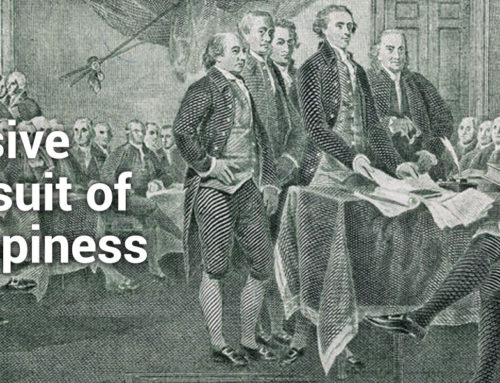In previous blogs (here and here), I have presented a comprehensive model of leadership that I have labeled The Performance Trilogy®. The framework describes the three fundamental processes that must be managed; strategy, execution, and leadership development and the three leadership roles needed for each process; leading, managing and coaching. Leading each of the three processes of the Performance Trilogy® requires very different attributes (i.e. talent and skills). The three most important attributes needed to successfully lead the strategy process are imagination, courage and persuasiveness. The three most important attributes needed to successfully manage the execution process are conscientiousness, productivity and discernment. The three most important attributes needed to successfully coach the leadership development process are integrity, empathy, and teaching skills. These nine attributes are universal and essential for sustainable success in any endeavor you pursue. In this blog we will explore the second of these coaching attributes required during the development process, empathy.
Empathy – The willingness to walk a mile in another’s shoes
While there are many attributes of good leaders, the one attribute absolutely necessary to be a great leader is empathy. Most everyone I’ve met or read about in business espouses the concept of empathy. How often have you heard expressions like “the customer is always right” or “our people are our most important product”? The problem is that most of the time these are empty slogans that are preached but rarely practiced. Why is this so?
There are multiple relationships one can have with another person. In business, the elemental relationship is utilitarian (a day’s pay for a day’s work, a promotion and raise for a job well done). This is the prevalent mindset of many leaders despite their rhetoric. This attitude can buy a person’s arms and legs but not his heart and mind. At a higher level of awareness, very good leaders build relationships based on enlightened self-interest. If I train and develop a person, they can make a larger contribution to my cause or initiative. If I help someone, they may be able to help me in the future. This attitude can buy a person’s loyalty.
Finally, at the highest level, great leaders build relationships based not on self-interest but on altruism, a genuine, unselfish caring for someone or some cause with no expectation of return. This attitude builds trust bordering on devotion. Aristotle in his Nicomachean Ethics described this type of friendship as virtuous involving both good character and intellect. The concept is easier to understand when it is related to great leaders such as Jesus Christ, Gandhi, the Buddha, or Martin Luther King. On a scale of 1 to 10, where 1 is a utilitarian relationship and 10 are an altruistic relationship, where would you rate with your team members?
A great current example of how effective an altruistic leader can be is Arthur T. Demoulas, the CEO of Market Basket, and the private supermarket chain. Despite decades of success in building the Market Basket, the Board of Directors fired him. While there were many undisclosed family disagreements, the official reason for his dismissal was essentially distributing too much of the company profits to the employees in the form of generous benefits including a profit sharing plan. His firing resulted in an unprecedented workers’ revolt. Hundreds of non-union warehouse workers and drivers jeopardized their livelihoods and refused to deliver produce to each of Demoulas’ 71 stores, thus crippling the supermarket chain. Employees also led a successful movement to boycott the stores. After several months, the company capitulated and as of this point in time has sold the company to Arthur.
What would cause employees to jeopardize their livelihoods and risk being replaced for their fired manager? Here are some of the quotes appearing in the August 27th edition of the Boston Globe that will shed some light on the matter. “”He’ll walk into a warehouse and will stop and talk to everyone because he’s genuinely concerned about them,” said Joe Schmidt, a store operations supervisor. “He cares about families, he asks about your career goals, he will walk up to part-timers and ask them about themselves. To him, that cashier and that bagger are just as important as the supervisors and the store management team.” Schmidt said Demoulas once called a store manager after he heard the man’s daughter was critically injured in a car crash. Demoulas wanted to know whether the hospital she was in was giving her the best care possible. “Do we need to move her?” he asked, Schmidt said. “He is just a good man,” Schmidt said. Demoulas is beloved by the workers not only for offering generous benefits — including a profit-sharing plan — but also for stopping to talk to workers, remembering birthdays and attending funerals of employees’ relatives. On my empathy scale described above, I would have to rank Arthur a 9 or even a 10.
Like Arthur T. Demoulas, truly great leaders listen, think, converse, and act empathetically the majority of the time. When listening to others, they focus both intellectually on what the person is saying, but also emotionally about what the person is feeling (i.e. listening from the heart as well as the head). When formulating plans, they factor in not only the potential outcomes but also the feelings and aspirations of others. When conversing with others, they hold their positions gently and try to understand the others’ point of view. Finally, their actions demonstrate genuine care for others. You know you are moving in the right direction when your heart warms knowing that you contributed to someone else’s success.
Graffeo and Associates is an organization committed to improving the quality of leadership in science and technology (S&T). It was formed in 2008 around the expertise of Dr. Tony Graffeo, a senior executive from Arthur D. Little and Battelle Memorial Institute. Dr. Graffeo has consulted with leading research institutions in the United States, Europe, Latin America and the Middle East, and has created a codified system of leadership development centered around the principles of the Performance Trilogy® which he has taught throughout the world. He is currently a professor at Northeastern University teaching Professional Masters entrepreneurship and leadership courses. His new book, titled “Leading Science & Technology-Based Organizations: Mastering the Fundamentals of Personal, Managerial, and Executive Leadership” will be published in 2018.



